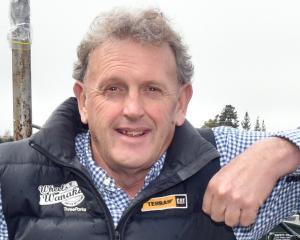
"Queenstown has people living by the lake and people living in cars," Housing Minister Chris Bishop told the House the other week, being well aware many of those cars are parked up alongside the lake.
The plight of those shacked-up in station-wagons came up during a wide-ranging annual review debate on the housing sector.

To be fair, Mr Mooney didn’t kick off with the problems in his own backyard — his opening remarks included observations on emergency housing, community housing providers, Māori housing providers, the social housing sector, the management of Kāinga Ora tenancies and housing on flood-prone land.
In fact, it was not even him who brought Queenstown’s housing woes into the debate —that was Dunedin Labour MP Rachel Brooking, who in response to a comment from Mr Bishop about the need for Kāinga Ora to build homes on land it had owned for years, chipped in from across the House to observe: "Yes, but that didn’t happen in Queenstown."
"Queenstown has some unique challenges around housing, and the best thing that Queenstown could do is let its city grow," Mr Bishop replied, and was set to embark on a discourse on one of his favourite subjects — why the Resource Management Act needs to be reviewed — before Ms Brooking chipped in again: "There were apartments ready to go that Kāinga Ora stopped."
("Southern Say" understands this was a reference to a planned project which dropped off the planning list after the change of government in 2023).
Mr Bishop quickly skirted past Ms Brooking’s assertion, saying Kāinga Ora did not have a presence in Queenstown (which is a whole other discussion), and went on to praise the work of the Queenstown Lakes Community Housing Trust and its chief executive Julie Scott.
"But the most fundamental problem with Queenstown is they have a housing market with the highest house prices in the country — on average, I think, 13 or 14 times the average household income."
"Fourteen," Mr Mooney clarified, the debate now well and truly on his home ground.
"Fourteen says Joseph. Julie does a fantastic job down there, but she’s struggling against a market that makes it very difficult to build," Mr Bishop continued.
"And I’m not saying anything public that I haven’t told the mayor, and in fact told the local media down there as well, which is that, from memory, Queenstown went through a draft plan change and they freed up an additional capacity of 14 houses — 14 houses, I think. I think I’m right in saying that. It might have been 15, but it was in the double figures rather than the triple. Whereas, in reality, they actually need an absolute bucket-load more houses."
And getting an absolute bucket-load more houses built is what Mr Bishop is all about.
But before one builds a house, one needs to have some land to put the foundations on, and that is one of the issues with Queenstown: thanks partly to geography, partly price and partly planning for infrastructure, finding a quarter acre on which to place your pavlova paradise is no simple task.
"When cities can’t grow, you end up with sky-high prices, sky-high rental prices, and people who are the workers in these towns can’t afford to get into the rental market in the first place," Mr Bishop said.
"There’s a limited supply of social housing there for a large number of different reasons, and so, as a result you have real, entrenched deprivation. This is my point: you have to sort the fundamentals and that is what this government is focused on."
But whether those fundamentals are actually being focused on was Ms Brooking’s question.
During an earlier discourse by Mr Bishop on social housing and affordable rents, the Dunedin MP observed: "We’ve all seen the apartments on Carroll St."
Ms Brooking’s point being no-one has seen the apartments on Carroll St, as they are one of 18 Kāinga Ora projects in Dunedin that have been paused for reassessment by the agency.
"Send me an email, I’ll happily go and have a look at them," Mr Bishop replied, missing Ms Brooking’s point entirely.
"But I opened the social housing development in Dunedin, it was last year. You were there. We came and did it together. It was good times."
That project was the Suzanne Lund Community Loft Apartments, and it was indeed a good time — it is an impressive complex and sorely needed accommodation. Its existence probably owes far more to the determination of developer Russell Lund than any vision of a government or government agency, past or present, but it does go to show if there is a will there might just be a way.
Coincidentally, later that week Constructive (the Construction Industry Forum) hosted the Southern Construction Summit in Queenstown, where Mr Mooney was a panellist.
Thanks to his experience earlier in the week, he was well primed to spruik the government’s consenting, product procurement and infrastructure policies.
So, there is a lot of talking going on about housing. Whether there is a lot of framing, roofing and wool carpeting going on is quite another matter.
Something for Mr Bishop to ponder as he plans his trip to Carroll St.
Lucky dip
A happy day for Labour Taieri MP Ingrid Leary last week when she won Parliament’s lucky dip and had her Property Law Amendment Bill picked out in the Member’s Bill ballot. More on this next week.












